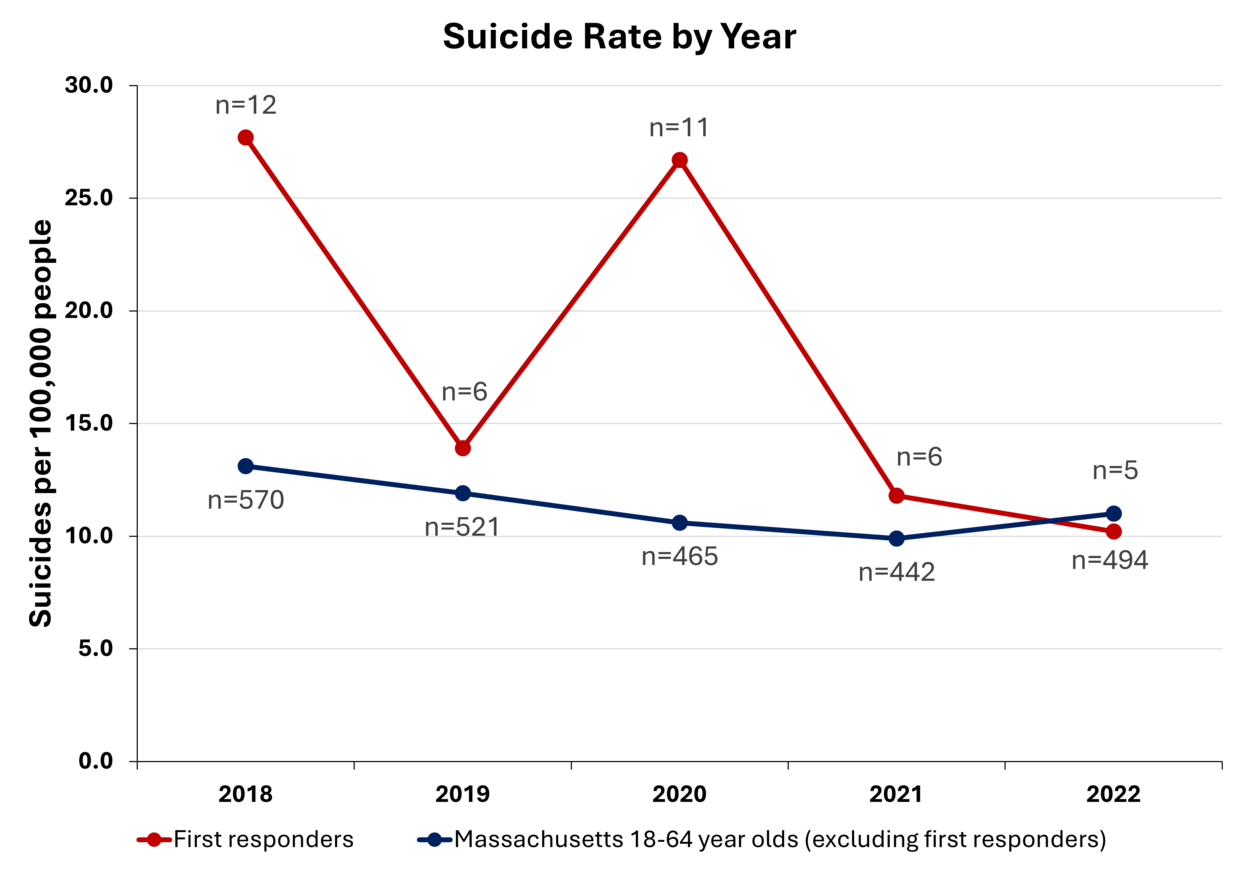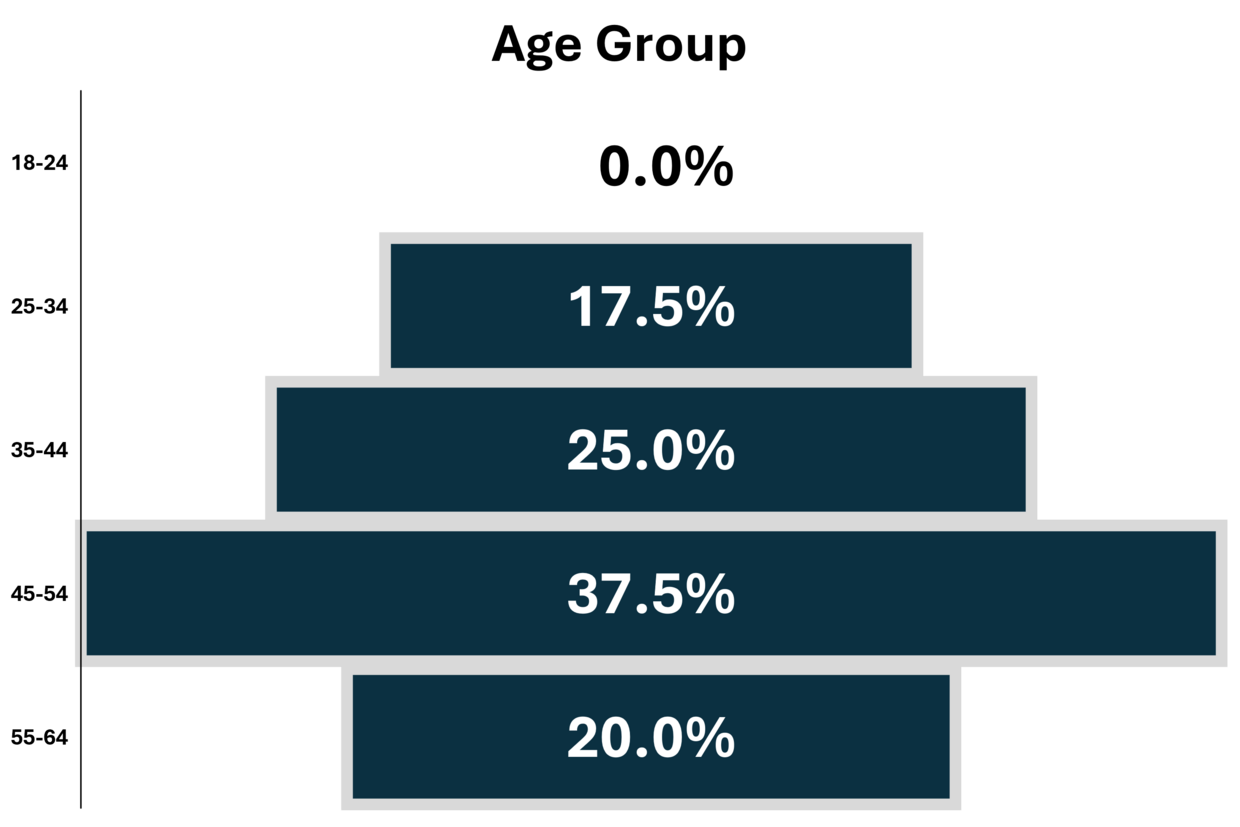Why is this important?
First responders face unique job challenges such as long and irregular shifts, exposure to work-related trauma and safety hazards, and potential grief and physical pain that can have lasting effects. These work stressors can be intensified by financial and interpersonal pressures as well as experiences of discrimination because of race, ethnicity, sexual orientation, gender identity, and age.
When facing poor mental health or a mental health crisis, it can be difficult to seek help due to feelings of shame or letting others down. First responders are often on the front lines helping others but may not know how to reach out for help themselves.
If you're a first responder, remember that your mental well-being is just as important as the work you do.
Deaths by suicide: A closer look at the numbers
From 2018 to 2022 there were 40 suicides among first responders in Massachusetts.
There are an estimated 40,000 first responders in Massachusetts between the ages of 18-64 years old. Among the affected occupations are paramedics, emergency medical technicians (EMTs), law enforcement officers, firefighters and emergency telephone operators.
The average annual rate of suicides among first responders was 17.4 deaths per 100,000 people. This was 1.5 times higher than the overall state suicide rate among those aged 18 to 64 years old.
Of the 40 suicides, 55% were among law enforcement officers, 25% were among firefighters, 17% were among paramedics and EMTs and 3% were among emergency telephone operators. One in four of first responder suicide deaths were also current or former military personnel. Almost 9 in 10 of first responders who died by suicide were White, non-Hispanic men.
From 2018 to 2022, the suicide rate among first responders in Massachusetts was higher than the suicide rate among the rest of the working-age population. First responder suicides peaked in 2020, likely due to the role of first responders in the COVID-19 response. Since 2020, first responder suicide rates have been decreasing in Massachusetts. Due to the uncertain change in first responder suicide deaths per year, it is important to continue monitoring this trend.
First responder suicides differed by age group. There were no suicide deaths among first responders aged 18 to 24 years old. 17.5% of suicide deaths were among first responders aged 25 to 34 years old. 25% of suicide deaths were among first responders aged 35 to 44 years old. 37.5% of suicide deaths were among first responders aged 45 to 54 years old. 20% of suicide deaths were among first responders aged 55 to 64 years old.
Methods of suicide among first responders
- 65% of first responder suicide deaths were by firearm
- 27% of suicides were by hanging or suffocation
- 5% of first responder suicides were by poisoning
- 3% of deaths were by other methods.
These methods used differed from the general Massachusetts public. Firearm suicides by first responders were 45% higher than the percent of suicides by firearm in the general Massachusetts public. Further, the method of suicide differed by occupation within the first responder group. 8 in 10 first responder suicide deaths by firearm were among law enforcement officers. This is 70% higher than the percentage of suicides by firearm in the general Massachusetts public.
Circumstances surrounding first responder suicides
Circumstances are conditions, facts, or events that can affect a suicide death. Understanding the circumstances surrounding first responder suicides gives us an opportunity to better focus our prevention efforts.
Among the 40 first responder suicide deaths from 2018 to 2022:
- 53% had a known current mental health problem
- 48% had a history of mental health treatment
- 38% had a current treatment for a mental health problem
- 33% had a known alcohol or substance use problem
- 25% had a known intimate partner problem
- 20% had a known job or financial problem
Data is from the Massachusetts Violent Death Reporting System (MAVDRS), Massachusetts Department of Public Health; CDC WISQARS
Population estimates used are from the U.S Census Bureau. (2022). 2018-2022 American Community Survey 5-Year file Public Use Microdata Samples. Retrieved from PUMS Data (census.gov).
First responder resources
Below are some resources to help with the first step in putting mental health first.
988 Suicide & Crisis Lifeline
If you or anyone you know show any warning signs of suicide, take it seriously. Get support and explore what help looks like. Call or text 988 to get help. You can also chat with a 988 Suicide & Crisis Lifeline counselor at 988lifeline.org. 988 services are free, confidential, and available 24/7/365.
Veterans and Military
Whether you're a military veteran or still on active duty, you can get help by calling the 988 Suicide & Crisis Lifeline and pressing "1" to reach the Veteran's Crisis Line. You can also text the Veteran's Crisis Line at 838255.
Massachusetts Behavioral Health Help Line
You are not alone. If you are not in crisis, you can call the Massachusetts Behavioral Health Help Line (BHHL) to get connected to mental health help, including therapy. This free service is for anyone in Massachusetts. Even if you’re not sure what kind of help you may need, someone will guide you through your options. Chat with a trained BHHL professional at 833-773-2445 or masshelpline.com.
MassMen
The MassMen Project promotes wellness and empowers working-age men across Massachusetts to take action to feel better emotionally, physically, and spiritually. MassMen offers peer support services to help first responders address mental health challenges and build a supportive workplace culture. Learn more about peer support and additional first responder resources.

